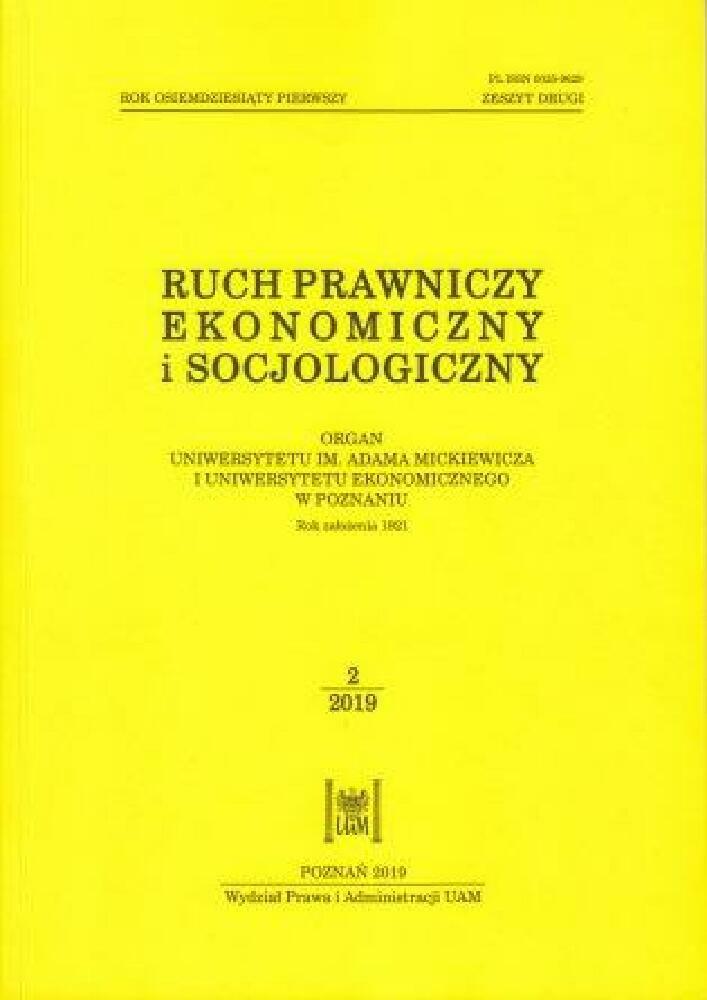Abstract
The article discusses the practice of invoking literary works in the jurisprudence of the European Court of Human Rights. The quantitative analysis of the case law allowed for the formulation of some conclusions. Firstly, literary references appear exclusively in dissents and concurrences, not in the Court’s judgments themselves. Secondly, the phenomenon of citing fiction in the ECtHR’s case law is neither common nor marginal. Thirdly, in the last two decades there has been a marked intensification in the use of literary references by the Court’s judges. Fourthly, the willingness to cite works of fiction in the dissent or concurrence is essentially independent of the judge’s nationality, sex or country of origin. Fifthly, literature is one of many extra-legal sources quoted in the ECtHR’s case law, among those such as philosophy, movies or music.References
Binder, G., Weisberg, R. (2000). Literary Criticisms of Law. New York.
Braithwaite, W. (1988). Why, and how, judges should study poetry. Loyola University Chicago Law Journal 19(3–4): 809–826.
Charnock, R. (2018). Argument and persuasion: the function of literary references in common law judgments, [w:] G. Tessuto, V. Bhatia, J. Engberg (eds.), Frameworks for Discursive Actions and Practices of the Law. Newcastle: 113–137.
Domnarski, W. (1993). Shakespeare in the law. Connecticut Bar Journal 67: 317–351.
Dworkin, R. (1975). Hard cases. Harvard Law Review 88(6): 1057–1109.
Gadbin-George, G. (2013a). To quote or not to quote: „Literature in law” in European court decisions and legal English Teaching. ASp: La revue du GERAS 64: 75–93.
Gadbin-George, G. (2013b). Literary references in United Kingdom common law judgments. GRAAT. Anglophone Studies 14: 79–95.
Henderson, M.T. (2008). Citing fiction. Green Bag 2D 11(2): 171–185.
Holmes O.W., Posner, R. (1996). The Essential Holmes: Selections from the Letters, Speeches, Judicial Opinions, and Other Writings of Oliver Wendell Holmes, Jr. Chicago.
Kamiński, I. (2015). Styl orzeczeń Europejskiego Trybunału Praw Człowieka, [w:] I. Rzucidło-Grochowska, M. Grochowski (red.), Uzasadnienia decyzji stosowania prawa. Warszawa: 367–385.
Leszczyński, L. (2015). Model decyzyjny sądowego stosowania prawa, [w:] W. Dziedziak, B. Liżewski (red.), Zagadnienia stosowania prawa. Perspektywa teoretyczna i dogmatyczna. Lublin: 41–53.
Liżewski, B. (2011). Wykładnia Europejskiej Konwencji Praw Człowieka, [w:] A. Kalisz, L. Leszczyński, B. Liżewski, Wykładnia prawa. Model ogólny a perspektywa Europejskiej Konwencji Praw Człowieka i prawa Unii Europejskiej. Lublin: 87–160.
Maroń, G. (2019). Odwołania do literatury pięknej w uzasadnieniach sądowych orzeczeń. Przegląd Sądowy 1: 87–104.
Maroń, G. (2018a). Odwołania do literatury pięknej w opiniach rzeczników generalnych Trybunału Sprawiedliwości Unii Europejskiej. Przegląd Prawa Publicznego 10: 11–28.
Maroń, G. (2018b). Integralność religijna sędziego oraz argumentacja religijna w amerykańskim procesie orzeczniczym. Rzeszów.
Młynarska-Sobaczewska, A. (2015). Narracyjność w aktach stosowania prawa. Państwo i Prawo 70(11): 52–67.
Nussbaum, M. (1996). Poetic Justice: The Literary Imagination and Public Life. Boston.
Osborough, W. (2008). Literature, Judges and the Law. Dublin.
Platon (1992). Państwo. Tłum. W. Witwicki. Warszawa.
Posner, R. (2009). Law and Literature. Cambridge.
Potter, P. (2005). Ordeal by trial: judicial references to the nightmare world of Franz Kafka. University of New Hampshire Law Review 3(2): 195–330.
Rzucidło-Grochowska, I. (2017). Strategie i techniki formułowania uzasadnień orzeczeń sądowych. Ruch Prawniczy, Ekonomiczny i Socjologiczny 79(2): 59–72.
Ryken, L. (1992). Words of Delight: A Literary Introduction to the Bible. Grand Rapids.
Scott, W. (1836). Guy Mannering. Volume 2. Boston.
Soto Hoyos, J.F. (2014). Jurisprudencia literaria en Colombia: los usos de la literatura en las decisiones judiciales. Summa Iuris 2(2): 217–251.
Szyszkowska, M. (2013). Literatura piękna jako źródło refleksji filozoficznych oraz wiedzy filozoficznej. Zeszyty Naukowe Politechniki Śląskiej. Seria: Organizacja i Zarządzenie 65: 413–418.
Ward, I. (2008). Law and Literature: Possibilities and Perspectives. New York.
Wedeł-Domaradzka, A. (2017). Opinie odrębne i ich znaczenie dla praktyki orzeczniczej ETPC – uwagi na tle doświadczeń w sprawach dotyczących początku życia ludzkiego. Polski Rocznik Praw Człowieka i Prawa Humanitarnego 8: 193–2012.
Weisberg, R. (1992). Poethics and Other Strategies of Law and Literature. New York.
White, J.B. (1973). The Legal Imagination. Studies in the Nature of Legal Thought and Expression. Boston.
Wijebandara, C. (2013). Fiction and poetry in judgments. JSA Law Journal 1: 1–16.
Wiśniewski, A. (2011). Uwagi o teorii interpretacji Europejskiej Konwencji Praw Człowieka, [w:] K. Gałka, C. Mik (red.), Między wykładnią a tworzeniem prawa. Refleksje na tle orzecznictwa
Europejskiego Trybunału Praw Człowieka i międzynarodowych trybunałów karnych. Toruń: 15–41.
License
Copyright (c) 2019 WPiA UAM

This work is licensed under a Creative Commons Attribution-NonCommercial-NoDerivatives 4.0 International License.





